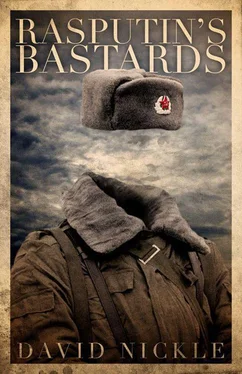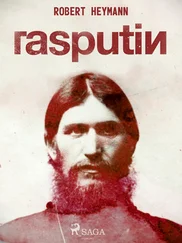“Chenko first met the kids eight months ago. It wasn’t exactly as Shadak understood it. A brood of them showed up in an old school bus — at an apartment block that Chenko found himself owning. Chenko had, unbeknownst to himself, taken a sizeable chunk of the station’s slush fund and thrown it into real estate. He’d put a half-dozen of his local muscle to work, clearing the place out and doing what minor repairs were required. Chenko met the kids — there were fifteen of them at that point — out front, and hurried them upstairs to the special suite he’d prepared.”
“Special?”
Mrs. Kontos-Wu nodded. “It was sterilized. Had to be. It was going to be a birthing room.”
“What?”
“That was one of the things Chenko didn’t tell Shadak,” said Mrs. Kontos-Wu. “Zhanna arrived in Odessa pregnant. She gave birth just a day after they arrived.”
“Pregnant.” Stephen crossed the narrow torpedo room and leaned beside her. “What — who did she give birth to?”
“They named him Vladimir,” said Mrs. Kontos-Wu. “He’s a very special baby.”
“Who are these kids?” said Stephen. “They’re like Fyodor Kolyokov is — was. Are they relatives of his? What? Why did he want them?”
“You ever hear,” said Mrs. Kontos-Wu, “of City 512?”
“No.”
“Me either. At least not — not at first.”
Ah fuck , thought Stephen. She’s tearing up again .
“What is with you?” he said. “You’ve never been this — this close to the surface before.”
Mrs. Kontos-Wu smiled weakly. “That’s so true,” she said.
“So what is it? What is it about this City 512?”
Mrs. Kontos-Wu took a breath. “Well — as it turns out — it’s the place where I was made.”
“Where is it?”
“I don’t know. Somewhere in Russia. The place is mostly underground — very secret, obviously — and it’s where Kolyokov — where he worked before he came to the United States.”
Stephen nodded. “Okay. That’s where he learned how to dream-walk. Where the sleepers like you came from. It’s also where these kids came from. That makes sense. They can dream-walk like Kolyokov could. So why’re you all misty?”
“Because,” said Mrs. Kontos-Wu, taking a deep breath, “I’ve known all that. All my life I’ve known all that. If I really concentrated — really pushed it — I could remember that I spent my childhood in a bunker in the Soviet Union. I could remember that these — these men from City 512 — took me and turned me into their puppet. But every time I would do that — it’d slip away. And I’d think about Bishop’s Hall. Where I went to finishing school to be a proper fucking young lady.”
“But you don’t have that problem now,” said Stephen. “So what’s the problem?”
Mrs. Kontos-Wu looked at Stephen. “Do you ever think back to the night your parents tried to kill you?”
“All the time,” said Stephen.
“Is it getting better?”
He thought about that for a second. “You mean less painful? Sure. I guess. Time heals, you know?”
“Well,” said Mrs. Kontos-Wu, “I haven’t had the luxury of time. This shit is fresh pain for me, because I haven’t been able to look at it squarely until now. So — so — please — fucking — excuse me — if I’m — a little—”
Stephen tried to duck out of the way as Mrs. Kontos-Wu lunged at him. She wrapped both arms around his neck, and Stephen prepared for the inevitable crack! as she snapped it. The unmerciful end. But all he felt was hot tears soaking through his shirt.
“— if I’m a little emotional !” Mrs. Kontos-Wu wailed.
“Oh.” Belatedly, Stephen raised a hand and patted Mrs. Kontos-Wu’s sobbing shoulder. He felt like it was the creepiest thing he’d ever done — but he kept at it, this comforting thing, until she closed her eyes and drifted to sleep.
Mrs. Kontos-Wu cleaned herself up for dinner. But she kept to herself as the five of them — her, Tanya, Ilyich, Stephen, and Uzimeri — sat around the little galley table eating their poached fish and rice. The engines thrummed and made the cutlery rattle where it sat. The mess smelled of fish and oil and battery acid.
“She is going through another phase in her recovery,” said Uzimeri. “Do not worry about her.”
Ilyich Chenko nodded. “We all went through this,” he said. “These children — they’re not like other dream-walkers we may have encountered. They need our help, but they don’t want to keep us tied up and in their unthinking thrall. So they release us. That is good — for it is always better to be a free man than a puppet. But it is also painful at first. Memory comes upon you in a torrent. Quite distressing. I am still sorting mine out.”
Tanya Pitovovich smiled and laughed. “I’ll take the pain of memory any day,” she said around a forkful of fish, “over oblivion.”
Chenko clapped and laughed. “Good,” he said. “We must all be so brave.”
Tanya reached across the table and held Ilyich’s hand. Stephen had to fight to keep from rolling his eyes.
Stephen cleared his throat.
“Tell me about the children,” he said. “Tell me about Vladimir.”
Ilyich disengaged from Tanya’s hand. “Vladimir,” he said. “The baby. You’ve heard about him?”
“Mrs. Kontos-Wu said he was born — in Odessa was it?”
“That’s right. We made a special room for it, in the top floor apartment. Whitewashed the walls and ceiling, tore up the carpets and scrubbed the floors down to the boards. The children brought two midwives with them. Pretty German girls. One had tattoos all up her arms and hair shaved short to her skull. The other one was a yellow-haired girl who couldn’t have been more than twenty years old. I wouldn’t have taken them for midwives. But they knew their stuff. They put me to work soon enough. ‘Boil the water, Chenko!’ ‘Bring the cloth, Chenko!’ ‘Stand here!’ ‘Out of the way!’ I did as I was told. It was good to have work to do, because it’s an incredible, terrible thing when a child is born. A woman comes apart for the occasion — split up the middle — and for a long time, it’s all blood and screaming. The pain is — indescribable.”
“How would you know?”
“I was assigned to be her coach,” said Ilyich. “That meant that I shared the pain of it with her — because of what she is, I shared it quite literally.”
“That’s a pisser,” said Stephen.
“No,” said Ilyich, “really it’s not. It was an agony — but when the baby Vladimir finally emerged — well, it was like looking upon the sun after spending a decade in gulag . Don’t wince. You asked about Vladimir and I’m telling you. The baby was special. When he looked at you, he was really looking at you: not like most babies, who just point their unformed little eyeballs in your direction and blink for two weeks. Vladimir could see. And he had — he had a voice.”
“A voice. What did he say to you?”
“‘Hello Ilyich Chenko. I am sorry.’”
“Fuck off.”
“No. That is what he said. ‘Hello Ilyich Chenko. I am sorry.’ I remember it like I remember my name. It seemed as though I could hear it with my ears. But it was not with my ears. He was speaking in my head. Using the immense powers of his mind.”
“Fuck. Off.” Stephen didn’t like being jerked around. “You’re telling me that a newborn baby called you by name and apologized.”
“I don’t blame you for being skeptical. I did not believe it myself when it happened. ‘Which one of you said that?’ I demanded. The midwives had no idea what I was talking about. Zhanna, who held her bloody little baby crooked in her arm, just ignored me. I didn’t repeat the question, because it was then that it dawned upon me that none of those three girls could have said what I heard. For the baby spoke in a voice that was deep and melodious. The voice of a grown man. And there were no men in the room but I.”
Читать дальше












